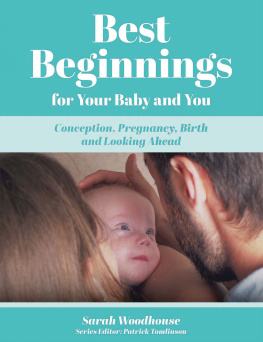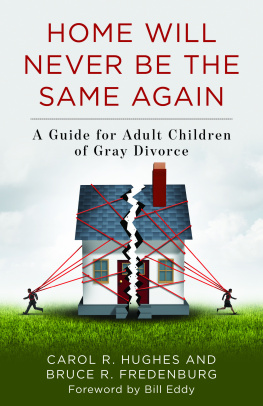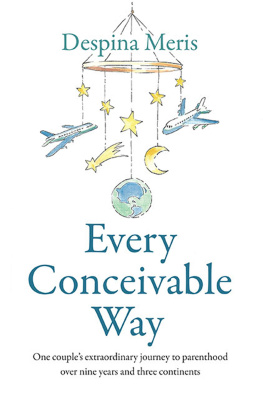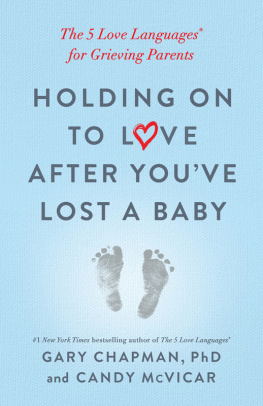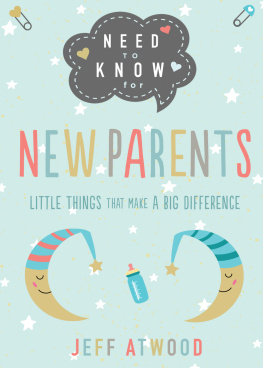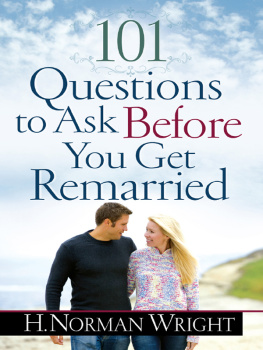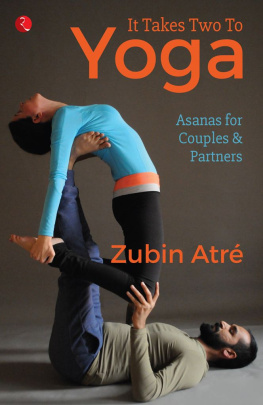First published in 2006 by
Rockpool Publishing Pty Ltd
Copyright Alison Osborne 2006
All rights reserved. No part of this publication may be
reproduced, stored in a retrieval system, or transmitted in
any form or by any means, electronic, mechanical, photo
copying, recording or otherwise, without the prior written
permission of the publisher.
National Library of Australia
Cataloguing-in-Publication Entry
Osborne, Alison, 1969 .
The post-baby conversation : what new parents need to
say to each other.
ISBN 978 1 921295 41 6 (epub)
1. Parenthood. 2. Man-woman relationships. 3. Parent
and infant. I. Title.
306.874
Rockpool Publishing Pty Ltd
24 Constitution Road, Dulwich Hill NSW 2203, Australia
http://www.rockpoolpublishing.com.au
Cover design by Nada Backovic
Front cover and internal image from Photolibrary Pty Ltd
Text design and typesetting by Bookhouse, Sydney
Visit us at: www.rockpoolpublishing.com.au
As important as your obligations as a doctor, lawyer, or business leader will be, you are a human being first, and those connections with spouses, with children, with friends are the most important investments you will ever make. At the end of your life, you will never regret not having passed one more test, not winning one more case, or not closing one more deal. You will regret time not spent with a husband, a child, a friend, or a parent ... Our success as a society depends not on what happens in the White House but on what happens inside your house.
Former US First Lady Barbara Bush in a speech to the graduating students of Wellesley College, 1 June 1990. Wellesley is a college for women only.
Preface
When my first child, Heidi, was 20 months old and I was 4 months pregnant with our second child, my husband Stewart and I had a transforming conversation. That conversation marked the end of a period of intense mental and emotional confusion for me, and the beginning of a fulfilling post-baby relationship for us. Until that time, our postbaby relationship had been struggling: there were powerful new emotions, unspoken expectations and relentless demands. I felt that we were two people adrift at sea in the dark, waiting for something or someone to tell us what had happened to our previous life. We were waiting for instructions as to how we could navigate ourselves back to the music and magic of our pre-baby days. Each of us wanted a glimpse of the person wed married and to remember what was so special about them. We wanted to have fun and laugh together again.
The transforming conversation took place one evening after Heidi had been put to bed. I was nervously and excitedly sitting on the couch in front of the television. Stewart was reading the paper and also trying to listen to what was on the television. I said that I had something really important to tell him and that what I had to say signified a real change in my life. When he finally looked across at me (and I admit he looked a little fearful), I remember telling him that I had finally accepted my new job my role as a mother and all the work that role entailed, and that I was happy (well, mostly) to do it.
It was that exchange which ultimately inspired this book. And although that conversation reflected a major change in my attitude and thinking, Stewart recently admitted that his recollection of that discussion was a little hazy; clearly, the event could hardly be described as life-changing for him.
I remember that earlier in the day on which that conversation took place, I had been standing at the kitchen sink washing dishes, and for the first time in 20 months I wasnt resenting what I was doing and wondering why was it me who had to do this. I accepted that this was part of my job now. For the previous 20 months I had been immersed in confusion, mostly about my new status, both in the world and in my relationship. I was confused about having to do so much more of what had previously been shared tasks, but even more about the sudden and abrupt end of my freedom. I was either stuck at home or had a child attached to me on a permanent basis. Everywhere I went I took not only my baby, but also nappies and wipes and changes of clothes for her, and changes of clothes for me, and later on a little esky bag which contained milk and biscuits and a water cup, all of which had to be prepared every time we stepped out the door.
And what really ate away at me initially was that I was totally sure my husband just didnt get it, as he would kiss me goodbye in the morning and take off for work. I would look through the window after him as I stood holding our baby, full of resentful resignation. For me to do what he just did would take hours of organisation. He couldnt possibly understand how severe the impact of suddenly losing almost total freedom was just as I couldnt possibly have imagined it before I became a mother. We were both besotted with our new baby girl, but my life had changed dramatically, while the life of the adult I lived with had not.
In that supposedly wonderful and exhilarating post-baby phase, I began to feel not only confused, but also less understood by my partner. The differences between us were growing; our experiences of parenthood diverged dramatically right from the start.
Our conversations became fragmented, emotional and humourless. They became less about understanding and more about logistics. They changed from being supportive and encouraging to being spiteful gripe-fests. When I eventually came to accept my new role and was able to talk about it with him, our lives stopped diverging, the battleground ceased to exist and I started to feel that we were in this together.
A number of factors got me to the point of accepting my role as a mother:
Stewart, (a farmer) had been tremendously supportive during my 10 weeks of morning sickness with my second pregnancy, and I believe he really tried to empathise with my situation. He has always been very involved and extremely helpful. He was my sole carer in the week following the birth of each of our children (we chose to homebirth on both occasions). I dont think I changed a nappy for the first few days after Heidi was born, and I vividly remember when she was a week old, being freaked out as he told me he really should get outside and do a few jobs today. I eventually discovered that the issues, for me, were less about how much he was doing (although I needed him to be involved and contributing) and more about me coming to terms with the changes in my life.
We arranged for me to have some financial independence. I had been used to having that and wasnt coping with feeling that I needed to justify any personal expenditure. The I am working too, Im just not being paid thing just didnt seem to work. And I was getting sick of having to hide any purchases that I couldnt think up a reason for. I was tired of feeling like a naughty child every time I bought something. I had become the child and my partner had become the parent in our relationship, and this accentuated my feelings of inferior status and inequality.
And third, acknowledgment that what I now did was my new job. This acceptance was fundamental, and in speaking with other women while researching this book, I noticed that it was something most women seemed to eventually experience. Most women get to a point where they stop seeing their partner as the solution and start to take responsibility for their own happiness. I had resented suddenly having to do all the cooking, washing, ironing, cleaning, grocery shopping, and most of the child-minding and parenting, but eventually I recognised that these tasks were part of my new job. While Stewart was out fencing or drenching cattle, I was also at work.
Being a mother is a 24/7 job; it demands many more hours than a full-time paid job. In my view, it isnt fair for one parent to take on that complete burden. Parenting is a shared domain, and Stewart and I do share the out of work hours childcare. He has always been 100 per cent in agreement with that. I do most of the during the day stuff, but Stewart helps through the nights, in the mornings and in the evenings and also on the weekends. He works all day, but so do I. Occasionally we get a babysitter and I help him with some cattle work for the day, which is a wonderful treat for both of us (I think!).


